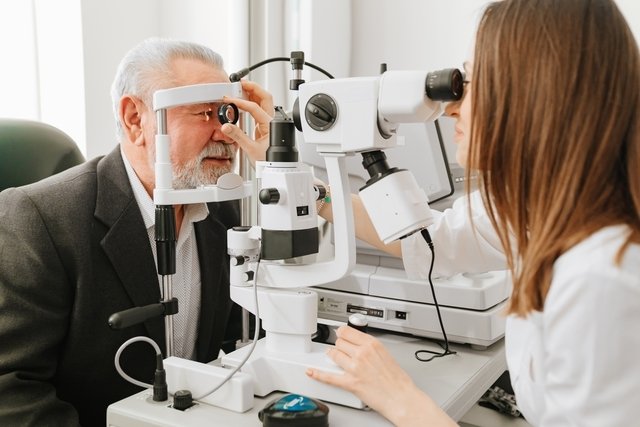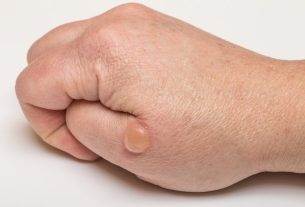Eye injuries can be caused by fingers, nails or dust, and can also be the result of blows, burns and direct contact with chemicals, such as cleaning products, for example.
An injury to the eye usually causes redness and discomfort in the eye, however, in more serious cases, there may also be pain, tears coming out and difficulty seeing.
Due to the risk of infection and even loss of vision, after eye injuries it is important to see an ophthalmologist as soon as possible or go to an emergency room. In these cases, the use of eye drops, antibiotics or even surgery may be necessary.

Main causes
The main causes of sores and bruises in the eyes are:
1. Corneal scratch (dust or nails)
A scratch on the cornea, also called corneal abrasion, is related to trauma caused by dust, rubbing the eyes too intensely, nails, sleeping with contact lenses or foreign bodies such as specks or dirt.
These traumas can cause a feeling of sand in the eye, as well as pain, redness, tears and even difficulty seeing.
What to do: Washing the eye with running water can help alleviate discomfort, and the scratch will often heal in about 2 to 3 days without any specific measures being necessary. However, due to the risk of infection it is recommended to consult an ophthalmologist as soon as possible for an evaluation, as antibiotics may be necessary.
Furthermore, when the scratch is related to foreign bodies, you should avoid rubbing or scratching the eye or trying to remove the foreign body with your fingernails, cotton swab or tweezers. In this case, it is also important to consult an ophthalmologist so that removal can be carried out with appropriate care. See more tips on how to care for a scratch on your cornea.
2. Punctures, cuts and blows to the eyes
Injuries to the eyes caused by sharp or sharp objects such as pencils, tweezers, kitchen utensils and blows can damage the eyeball and cause symptoms such as swelling, bleeding, pain, redness, excess tears and difficulty seeing. Furthermore, if the object is dirty or contaminated by microorganisms it can cause a serious infection.
What to do: It is important to seek an emergency room as soon as possible so that the most appropriate treatment can be initiated, which may involve the use of antibiotics and, in the most serious cases, surgery. Furthermore, the object causing the injury should not be removed from the eye until evaluated by an ophthalmologist, even if it is visible. It is also recommended to avoid coughing or applying pressure to the eye to avoid making the injury worse.
3. Injuries inside the eye
Injuries inside the eye can result from blows or accidents and cause bleeding that can be noticed by the presence of blood inside the eye. Generally, in addition to pain and redness in the eye, there may also be difficulty seeing.
What to do: In case of suspected injuries inside the eye, it is important to seek an emergency room as soon as possible for an assessment and initiation of the most appropriate treatment.
4. Heat burns or sparks from welding
Injuries caused by heat burns or welding sparks can cause symptoms such as sensitivity to light, pain, redness and tearing. Furthermore, when caused by welding sparks, symptoms can take up to 12 hours to appear.
What to do: In case of heat burn, it is recommended to wash the eye and eyelids with cold running water and place a damp cloth over the eye regularly until medical attention is sought. Additionally, bandages should be avoided because they can worsen corneal wounds and ulcers. In all cases of burns, it is important to go to an emergency room as soon as possible for an evaluation.
5. Chemical burns
Chemical burns can be caused by the use of substances such as acids and gases at work, car battery explosions and cleaning products, for example.
These injuries can cause symptoms such as pain, redness, increased sensitivity to light and difficulty seeing.
What to do: Due to the risk of permanent vision loss, it is important to seek emergency care as soon as possible so that the most appropriate treatment can be initiated. Treatment usually involves washing the affected eyes with serum or running water to neutralize the irritation caused by the substance. In addition, treatment with medications such as antibiotics and lubricating eye drops may be necessary.
Consequences of eye injuries
When not treated properly, eye sores can cause:
- Permanent loss of vision;
- Infections;
- Corneal ulcer.
Due to the risks involved, it is important to consult an ophthalmologist as soon as possible and, especially in cases of injuries, foreign bodies and burns, seek an emergency room so that the most appropriate treatment can be started as soon as possible.

Sign up for our newsletter and stay up to date with exclusive news
that can transform your routine!
Warning: Undefined array key "title" in /home/storelat/public_html/wp-content/plugins/link-whisper-premium/templates/frontend/related-posts.php on line 12
Warning: Undefined array key "title_tag" in /home/storelat/public_html/wp-content/plugins/link-whisper-premium/templates/frontend/related-posts.php on line 13



